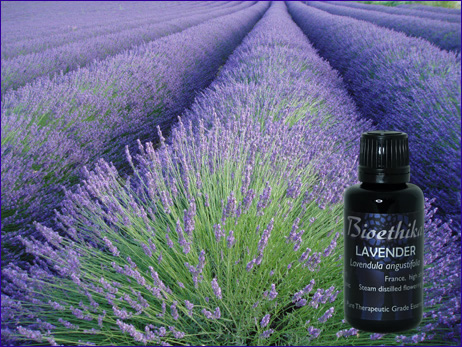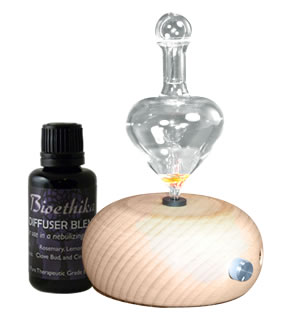Ingrid Naiman

The sense of smell is the most fundamental
of the five physical senses. Not only does it work in harmony
with the survival instinct, but it "informs" us of
much more, consciously and unconsciously. We must breathe, and
this is so automatic for most of us that we do not even think
about the process of inhalation and exhalation, the exchange
of vital prana for depleted air, the gift of inspiration and
life.

 |
Each of the five senses is related
to an element, a chakra, and an
endocrine system. The sense of smell is related to the first chakra and
the adrenal glands. |
Studies have been done to show what stresses
people the most. Much to the surprise of some who probably have
not thought about this before, financial worries, ill health, divorce,
and death, while stressful, do not compare to odor. Nothing wears
us out faster than a smell we cannot stand.
Likewise, many of us
are like mindless idiots when hit by a wave of pheromones that
seduce on a level our pets understand but we fail to recognize.
For an animal, a smell is full of information, as Sonya Fitzpatrick
the Pet Psychic says, a sniff around the neighborhood is for a
dog what reading a newspaper is for us.
The fact that we do not
consciously interpret odors does not mean that they are not affecting
us on some level. You might think of this in the same way that
you think about microwaves: you do not "feel" them, but
they are impacting you and causing distress whether you know it
or not.
Likewise, the unconscious is making use of scents to warn
us of danger in the air. For instance, we learn to shun tainted
food and to crave savory dishes because our sense of smell alerts
us to what to avoid and what to ingest. It, in turn, triggers the
adrenals to send little hormonal messages that act as catalysts
to move towards safety or prepare the body for a feast. A lovely
aroma will stimulate the salivary glands to anticipate a fine meal,
and the arousal gets the gastrointestinal system cranking so it
can begin the churning and transformation of food into nutrients
the body can use.
Odor versus Aroma
However, smell goes well beyond noxious odors
and sensual pleasure. We might divide smells into repulsive and
attractive. A bad smell or a smell one does not like is really
repugnant. Generally, no amount of persuasion will convince someone
that a bad smell is good. People like certain odors or they don't
like them. They like the smell of garlic or chaparral or they don't
like these smells. Likewise, they like the smell of certain perfumes
or they find them cloying and annoying.
| "Honor your senses" |
I have a garage full of
soaps and incense that are overwhelming to me; however, there are
some smells that are blissful and uplifting. It's important to
honor our preferences so that we do not add to our stress by trying
to like something we really do not like. |
Since many of the associations with particular smells are unknown to the conscious mind, it behooves
us to pay attention to how we feel around certain smells. Because the sense of smell is related to the earth element, very sturdy,
strong people with abundant energy and endurance usually have an
enormous tolerance for odors that some people cannot stand. Such
people may like the smell of fresh-cut hay or even a stable or
perspiration. It seems natural to them; they feel renewed by the
image of the Earth in its endless cycles, including the cycles
of work and rest. These people will not mind some real odor, but
they may also be responsive in profound ways to more seductive
smells.

A
person who is adrenal exhausted, fragile, and environmentally sensitive
will detest the smell of cigarettes as well as most body odors
and perfumes . . . not to mention petroleum fumes and cleaning
agents. These people need to avoid such smells, but they can be
nurtured by wafts of delicate aromas that are uplifting, like a
whiff of citrus peel or fresh basil. These smells actually soothe
them; they help such persons to feel clearer and more focused. So, while smell is related to the earth element, it does wonders
for the air element as well.
 It is not a myth that certain smells
are detoxifying. Years ago, I was lecturing at a seminar on a college
campus in the smoggiest part of Los Angeles. The freeways and motel
room smelled awful but the campus, just across the street, was
actually invigorating. It had thousands of eucalyptus trees growing
everywhere and was exhilarating.
It is not a myth that certain smells
are detoxifying. Years ago, I was lecturing at a seminar on a college
campus in the smoggiest part of Los Angeles. The freeways and motel
room smelled awful but the campus, just across the street, was
actually invigorating. It had thousands of eucalyptus trees growing
everywhere and was exhilarating.
Similarly, something like basil
is oxygen-rich so it improves transport of this vital molecule
so that our blood feels more alive and our brains are more alert.
It's not an impression, it actually happens.
When a person is toxic,
there may be malodorous smells deep inside the body as well as
exuding from the pores of the body. In a severe case, this could
lead to irritation of the nerves and spasms. I have often held
an open bottle of an essential oil under the nose of someone in
the midst of a seizure only to have them recover quickly and smoothly
without the usual feeling of fatigue afterwards. These scents purify
the body of noxious odors and allow the various systems of the
body to rest.
 |
You might thus say that a purifying aroma has the
power to neutralize a toxic odor. This is obviously much more efficient
if the vapors are consciously assimilated and circulated throughout
the body through focusing on the inhalation, movement of wind,
and exhalation of air. Our respiratory systems were designed to
exchange spent air for inspiration, but we can improve the efficiency
of the exchange by deliberately inhaling vitalizing fragrances. |
In
observing people under a lot of stress, I have learned that the
less resilient we are, the more sensitive we are to odors. We are
actually defenseless against the odors that wear us down. However,
we are renewed by the fresh smell of a waterfall shooting its negative
ions into the atmosphere and enhancing our own sense of well being.
Usually, the spectrum is fairly wide. In the beginning of a stressful
period, reactivity to smells is heightened. This is generally true
of everyone; and it is a sign of Nature working at Her very best,
alerting us to the need to take better care of ourselves by not
subjecting ourselves to what is enervating. The second phase is
however different for the rugged adrenal types in that many of
these people actually lose their sense of smell. It fails to act
as the early system it is supposed to be.
Sometimes, this loss
occurs suddenly, after shock or surgery. Usually, the ability to
smell comes back after a suitable period of adjustment or convalescence,
but it may still be diminished for a long time.
For people who
always were a bit more sensitive, the sense of smell becomes increasingly
acute so the sensations are also extremely pleasurable or unbearable. The number of odors that are deemed intolerable tends to increase
until a point is reached where the individual is moving in the
direction of healing rather than greater illness.
It is not unusual at all for some people to react adversely to everything with even
a hint of synthetic ingredients. Such people can smell the dyes
in clothes, the artificial additives in foods and household products,
and sometimes what others ate days ago.
Obviously, human beings
are severely distressed by such heightened sensitivity. They desperately
need to heal . . . and they will not begin to heal until the stressors
in their lives are reduced, including smells they can't stand.
To "normal" individuals, people in this condition seem
overreactive, but they are not psychotic and they do not have severe
cases of hypochondria. They are exhausted and they need to recognize
this so they can adopt sensible measures to recover. One of these
sensible measures is delicate inhalation therapy using extremely
pure and aromatic substances, natural smells such as fresh herbs
or spices or totally unadulterated essential oils.
Because such people are hypersensitive, they need brief efforts in the beginning
until feeling more emotional and physical elasticity. When
this inhalation is accompanied by meditation or at least absence
of intrusion, the results can be quick and decisive. Not only do
people feel more centered, but they experience a lessening of anxiety
and sometimes illumination.
 |
Anyone who wants to try this can simply
put a drop or two of essential oil on the palms of the hands, rub
them together and then cup the hands and take a few deep breaths
of the aroma. |
You can also rub some fresh herbs or fruit on the
hands and do the same. Wetting a cloth with hot water and a scent
and breathing through the cloth is another way to inhale the purifying
aroma. Until recovering the sense of smell, tranquility, and stability, adrenal
tonics and strategies can be used.
Copyright by Ingrid Naiman 2003, 2011




 It is not a myth that certain smells
are detoxifying. Years ago, I was lecturing at a seminar on a college
campus in the smoggiest part of Los Angeles. The freeways and motel
room smelled awful but the campus, just across the street, was
actually invigorating. It had thousands of eucalyptus trees growing
everywhere and was exhilarating.
It is not a myth that certain smells
are detoxifying. Years ago, I was lecturing at a seminar on a college
campus in the smoggiest part of Los Angeles. The freeways and motel
room smelled awful but the campus, just across the street, was
actually invigorating. It had thousands of eucalyptus trees growing
everywhere and was exhilarating.


